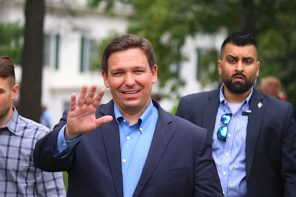If the roundtable discussion hosted by George Stephanopoulos on Sunday was any indication, then the prospects for meaningful and substantive reform of the current health care system are dim indeed—at least until after the 2010 midterm elections.
The Republican Party smells a winning agenda item, and they may well be right about that. Ironically enough, they have found it in a domestic agenda item; after a botched foreign policy inherited from the previous administration, and its profound electoral cost. By contrast, the Democratic Party can’t summon the unanimity required to achieve anything of substance with its paper-thin and all-too-vulnerable legislative majorities.
This is not necessarily a bad result. Democratic reform takes time, and normally comes on the tail-end of long, and often volatile, deliberation. It takes a lot of talk, some of it strident, most of it not, to get things in line. These town hall meetings should have been conducted before any bills were drawn up, but perhaps they will provide the prelude to more meaningful legislative initiatives down the road. The White House has shown itself, arguably for the first time, less than astute at grassroots organizing. They’ve simply been out-flanked, as well as out-grassrooted, by the right. This is also not necessarily a bad thing for the republic.
The tenor of public debate thus far has not been high. Many commentators here on RD and elsewhere have correctly pointed this out, and gestured to the cultural costs, as well as to the implicit religious meaning of it all. There has been too much screaming and too little reflection; too much name-calling and too little argument; too much fearmongering and not enough consideration of what we fear, and why.
But beyond these procedural problems and pitfalls, there is one problem of far greater consequence: many high-profile liberals and conservatives continue to talk past one another because they are not talking about the same things. Their sense of what this is fundamentally a debate about is different, party to party. Is this about economics or social justice? Odder still, the traditional party lines of affiliation seem upside down.
The Democrats represent this as fundamentally a debate about cost containment: let’s act before health care bankrupts the economy. It is fundamentally a question of economics. Far from being the big spenders of conservative mythology, they’re in the unusual position of arguing that a big government program will actually save money and reduce costs. They may be right about that; it’s very hard to know. But what is odd is the disconnect between the public representation by the leadership and the beliefs of the base: most liberals and progressives probably share an intuitive sense that universal health care is a matter of fundamental social justice.
Conservatives represent this as fundamentally a debate about socialized medicine and a big government takeover; i.e. a question of social justice and political philosophy. They find themselves in the ironic position of arguing that adding a public insurance option to the mix (which is to say, more competition) will not only not lower costs, but will actually drive private insurers out of business.
If so, their opponents suggest, that would seem to indicate that the private insurers were not efficient, and the market corrected for that fact by driving them out of business. Fair enough.
Conservatives respond by noting that this would be a competition among unequal players. The government is a regulator, a rule-setter, as well as a competitor, and thus would enjoy an unfair advantage against the private insurers against which its public option would be competing. Fair enough. But here too the disconnect between the representative leaders and the base is great: most Republicans probably share an intuitive sense that there is something wrong with universal coverage we cannot afford and the deficit spending it will require; i.e. that it’s fundamentally a matter of economics.
I continue to worry that the model of market competition, the very notion that health care is best conceived as a for-profit industry, is one of the things that makes this debate a non-starter. So long as we imagine health care provisions in these terms, and only in these terms, everyone at the roundtable sounds right.
George Will says that in the 1950s Americans spent, on average, roughly 53% of their earned income on food, shelter, health care, and education. Today of course the balance has shifted seismically in the direction of increased health care costs. I don’t know where he’s getting his numbers, but they sound plausible, given how much Americans now spend on exorbitant luxury items: primarily electronics, cars, and houses.
The Republicans sound reasonable in saying that the majority of citizens in the United States have health insurance, and that the majority of them are content with what they have—by which they seem to mean they are afraid of losing what they have.
Paul Krugman and Robert Reich sound reasonable in observing that these same people are concerned about the rising costs of their own premiums, the higher deductibles, and the obvious fact that insurance provision is becoming so expensive that private businesses are rapidly getting out of the game. The people who are afraid of losing what they have are going to lose what they have, unless we do something fairly dramatic.
It is this uncertain future that worries and perplexes liberals.
The current system is going to change pretty dramatically whether we do nothing or do something big. And as Marx noted in his famous “Eighteenth Brumaire of Louis Bonaparte,” human beings can change the world, but they cannot change it just as they wish. The revolutionary who has a very clear picture of what the revolutionary future should look like will never see it. The world, and the human opposition, will intervene. This is wise counsel for the well-intentioned revolutionaries, both conservative and liberal: the responsible ones, the ones who note that the current system is not tenable for much longer without serving as a significant, further drag on our hobbled economy. Both liberals and conservatives would be well-advised to note that the changes for which they are calling are not likely to be the ones they will get.
Principled compromise is the prescription for what ails us all.
Terri Schiavo Was a Governmental Death Panel
One reason the debate about health care is so difficult, and so uniquely charged and volatile, is the very ubiquity of the industry. Modern medicine intervenes in every aspect of our lives. It is a curious “business” indeed; this business that creates and multiplies our desire for more of it. Health care, if it is a business, is a business that generates its own market, generates its own needs.
And here, I think, is where religion enters the fray.
There is a story to be told about how modern technology (if not modern science itself) has gradually encroached upon fields once reserved for religion. We might do well to start with birthing and dying.
Midwifery was the way of the world until the nineteenth century, when modern medical doctors, most of them men, took over what had always been a feminine sphere. So too, death. Dressing out the corpse used to be done at home, primarily by women; now it is done in a “funeral home” that is not our home at all. Gary Laderman has told this story with compelling drama, sensitivity, and skill.
And here is yet another reason why the image of “death panels” refuses to go away. If modern medicine has encroached upon the spiritual domains of birthing and dying, then we ought not be surprised that certain religious ideas continually resurface in the context of this debate. The fear, as I noted last week, is real. It is also being exploited.
Here once again, maddeningly, both sides are right. But only up to a point.
The fear captured by the term ‘death panel’ is best seen in the image the president has regrettably and unwisely chosen to repeat: “pulling the plug on Grandma.” This phrase is deeply offensive for many reasons.
Far and away the most important is that one ironic result of modern medicine’s advances is all of the ways we can now keep a human body functionally alive. The decision to pull the plug on a loved one is an anguishing decision that most contemporary Americans will face and do face; this was not an issue in George Will’s 1950s version of the American Dream. Such anguished decisions ought never be turned to political gamesmanship. And a sanctity-of-lifer like Sarah Palin, if she were serious, would be ashamed of starting this game. In general, Palin simply does not demonstrate the intellectual curiosity or stamina to understand what is implied in what she says, nor the moral seriousness to worry much about it.
Others in her camp clearly do. And they are the ones with whom I want very much to discuss health care reform.
For religious values intervene decisively here. We should recall that many people decide against receiving extreme care to prolong a terminal illness, moving instead immediately to hospice, and then die in relatively short order. There is great courage, and great religious conviction in such a decision, as anyone who has witnessed a loved one make such a decision knows well.
Others, particularly those without a “living will,” become pawns in a tragic game pitting the religious values of various family members and loved ones against each other. It was not so very long ago that the Republican-controlled Senate, and ex-President Bush attempted to intervene in the name of a single person, Terri Schiavo, to weigh in favoring the wishes of her biological family against her husband’s representation of her own wishes.
That was a governmental death panel, and most citizens wanted no part of it. So this really is an odd position for an adamant right-to-lifer like Sarah Palin to take. She wants death panels; she just wants to be assured that the decisions they will render accord with her own religious values. And that is something no government panel in a secular state can allow.
No one knows what will happen next; that’s kind of a credo for this whole issue.
The Democrats are not united behind the idea of the importance of a public option. The option’s defenders have never explained it very clearly, and they insist that it is a very small portion of the total bill.
If so, their Republican opponents counter, then why not let it go? That’s a fair question.
But it is a question posed in bad faith by Party members who have achieved their apparent unanimity by being oppositional, contrarian, and obstructionist. This will not be a good strategy in the intermediate political term, as medical costs continue to skyrocket; precisely as the President warns us they shall. And as American businesses continue to bear the brunt of this, at a time when no one feels that they have the means to absorb additional costs of anything.
There is a lot in the current debates, on all sides, that seems right and fair. There is a lot that seems wrong and out of bounds, too. But the larger question—the question of what this is ultimately a debate about—needs greater clarity. Perhaps if we could agree to the terms about which we are debating, then we might be able to debate them in a manner less shrill and at least somewhat more productive.
Does the question here not ultimately concern what the proper role of a modern government really is?
Is it a massive custodian of an even more massive economy? Is it the primary bulwark that defends the people against acts of injustice and abuses of power? Is it the final guarantor of certain inalienable services like food and shelter and education and security and health care?
By posing the questions in this way, perhaps the question regarding a “public health option,” or “death panels,” or “government control” of health care might be meaningfully reframed.
Is this a question of economics, or of social justice? And if it is both (as surely it is), then how might we combine these important concerns and varying conceptions of the modern state?
At the end of the nineteenth century, faced with similar conundrums, the great sociologist of religion, Emile Durkheim, ventured the following observation. Curiously, it was inspired by his own meditation on the question of death—not death panels, but rather the uniquely modern quality of suicide.
In the past, Durkheim observed, people sometimes committed suicide for religious reasons; I referred to that phenomenon earlier. But no longer.
Actually, religion has lost most of its power. And government, instead of regulating economic life, has become its tool and servant. The most opposite schools, orthodox economists, and extreme socialists, unite to reduce government to the role of a more or less passive intermediary among the various social functions. The former wish to make it simply the guardian of individual contracts; the latter leave it the task of doing the collective bookkeeping… But both refuse it any power to subordinate other social organs to itself and to make them converge toward one dominant aim. On both sides nations are declared to have a single or chief purpose of achieving industrial prosperity…
(Durkheim, Suicide, Chapter Five; italics mine)
Can a modern state be conceived as something more than a guarantor of contracts? Can our political leadership articulate grander goals and more meaningful aspirations, something through which we might actually “converge toward one dominant aim”? Is the nation to be something more than a prosperity machine, functioning rather badly just now, and due for further tinkering?
The wars. The bailouts. And now health care.
Each of these issues has been discussed in primarily economic terms. What might viewing them all a different way, with genuinely common purpose, achieve?
Here it seems to me, is the question within the question. And here is where religion has something decisive to contribute, across the entire political spectrum, once the polemics and hysterics subside.




